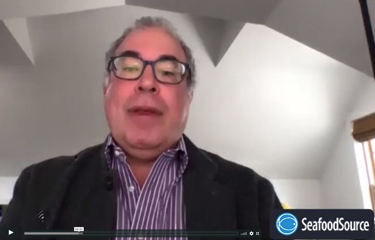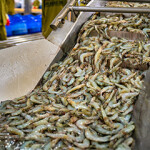Four questions with Arlin Wasserman on Changing Tastes’ “Seafood and the Broader Protein Market” report

We are at a “once-in-a-lifetime” event or even a once in two generations event where American consumers are reconsidering what they eat, according to Arlin Wasserman, the Founder and Managing Director of seafood consultancy Changing Tastes.
In a video interview with SeafoodSource reviewing the findings of his latest "Seafood and the Broader Protein Market" report, Wasserman said U.S. consumers are changing how they view seafood in the broader protein market, and said the seafood industry can do more to capture a larger share of the protein market.
SeafoodSource posed four questions to Wasserman:
- What should the seafood industry understand about what’s happening now in the broader protein market?
- How do consumers view seafood compared to other proteins?
- How does the farmed versus wild debate affect consumer decisions about what kind of seafood to buy, or if they should by seafood at all?
- How do sustainability and ocean health issues affect consumer choices about whether to eat fish and seafood and what ki9nd of seafood to buy?
Wasserman said his research found U.S. consumers are increasingly looking at seafood as a replacement for red meat in their diets. In the past, they have replaced red meat with chicken, so “fish and seafood is poised to come on the plate in a bigger way,” he said.
Conventional wisdom is that fish and seafood is seen as healthy choice, but that’s not true for younger consumers who are more skeptical about health and sustainability of fish, Wasserman said.
“Younger consumers are also connecting ocean health issues with their own health when eating fish and seafood – these ocean health issues are not in the control of seafood industry,” he said. “A plant forward diet is about reducing the size of the protein portion and this fits very well with seafood – restaurants can reasonably serve more expensive proteins. Recent launches of plant based meals with a moderate amount of fish and seafood is the right direction – that will be adopted in restaurants and in home kitchens. While meals with more plants in them will increase, plant-based replacements that are manufactured we see as a bubble that is already popping.”
The seafood industry also holds a potentially antiquated view of the farmed versus wild debate, according to Wasserman. The harvest type or sources are less important to younger consumers, he said, and food safety is rising as a factor in whether they buy seafood or not.
The coronavirus crisis is accelerating preexisting trends in the American marketplace that favor seafood, Wasserman said.
“For the consumer to eat a lot more fish and seafood, imagine if we could get another four pounds [of consumption] per person per year as we give up another 10 pounds of beef,” Wasserman said. “If we think about sustainability as how the environment and our product interact, that will help us be better marketers of our products.”






Share